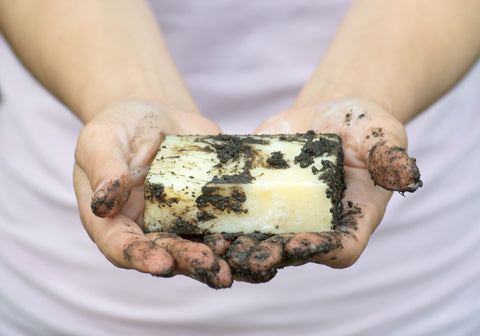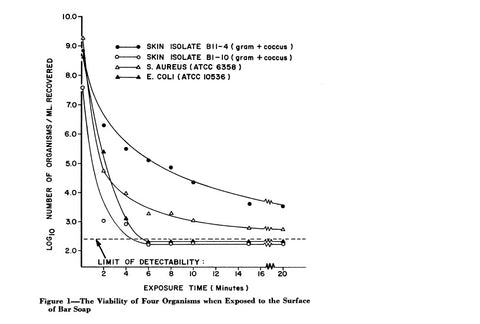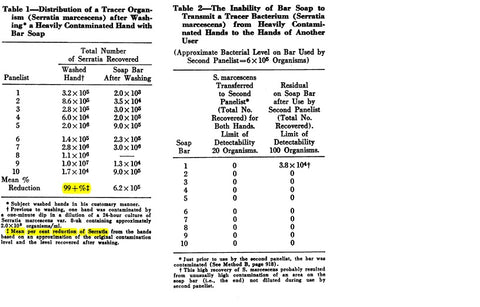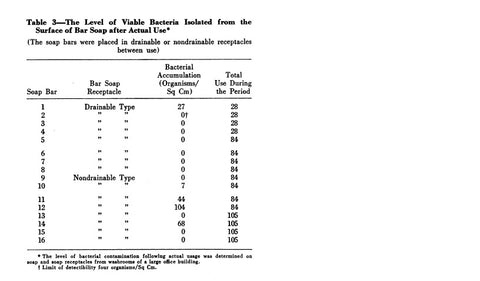
Are there germs lurking in your soap dish? Is sharing soap unsanitary? Can you get sick from your soap? These are some of the questions I get asked about using a bar of soap. You want answers, and you've come to the right place. Take a seat as we dig up the dirt on soap.
After the first awareness to antibiotic-resistant Staphylococci, in 1947, researchers have been searching for factors contributing to the "staph problem" and attention has been placed on objects which could be transferring the disease. They found abundant bacteria on "bedding, floors, eating utensils, bathtubs, houseflies, air ducts, water carafes, mops, floor wax, sinks, water faucets, telephones, domestic animals, facial tissues (not used), and even bank notes." It sounds like a recipe for a disease outbreak.
Since reducing hospital-related outbreaks depends entirely on the cleanliness of the facility, a series of studies in 1965, a study in 1988, as well as the initial conclusion by Koch in 1881, were performed to determine whether or not bar soap (without antibacterial additives) aided or inhibited the spread of disease. The following are studies done on true soap (fat & alkali), not on a bar of detergent. We'll talk about the effectiveness of detergents in another post.
Study 1 -- Self-Sterilizing Capacity of Bar Soap
Several different organisms were introduced to the surface of bar soap and left in a saturated humidity chamber to encourage bacterial growth for 18-24hrs then sampled after a length of time to determine their viability. They were tested at several minute intervals to find that the bacteria decreased by 100,000 fold in 15 minutes.

From Figure 1 above, we see Staphylococci aureus nearly eliminated, while E coli. is no longer detectable. Even when encouraged to grow by saturating a soggy bar of soap with humidity, they continued to die.
Study 2 -- Transmissibility of a Tracer Bacterium by Bar Soap
This study was conducted by the participants dipping their hands in a bacteria solution that heavily contaminated their hands to 1,000 times the amount that is normally found on skin. The first person is to wash their hands, then immediately pass the soap on to the next participant with heavily contaminated hands to see if bacteria can still be transferred before expiring on the bar of soap.
The bacteria solution chosen was Serratia marcescens because it's easy to differentiate from bacteria normally found on the skin, it adheres readily to the skin, and it's hardier against soap.

Table 1 shows that there was a 99% reduction of bacteria on the skin with even the most heavily contaminated hands, although, it transferred bacteria to the soap. However, Table 2 shows that despite that there was bacteria transferred to the soap, it wasn't picked up by the second user. I don't know about you, but I'm impressed.
Study 3 -- Accumulation of Bacteria on Soap During Actual Usage
Bars of soap were left at large office-laboratory building for several hours to see if bacteria accumulated and build up occurred on the bar of soap during actual heavy use.

Table 3 shows that despite the slight accumulation of bacteria in a non-draining dish compared to a well-draining dish, no significant build-up occurred as a result of heavy hand washing.
Historically, soap revolutionized the medical industry when physicians began washing their hands and the patient before surgery (source, section 13.5). Florence Nightingale laid the foundation of nursing by separating the wounded from the sick, bathing patients, and handwashing which greatly improved hygiene in the hospital and reduced deaths from 42% down to 2% (source).
Soap works in two ways. It physically cleans surfaces by mechanically removing dirt. However, because of the high pH, it is also inhospitable to microbial growth making it a disinfectant as well.
The points to take away from these studies:
- Bar soap is inherently bactericidal by it's chemical nature
- Bar soap does not support the growth of bacteria
- Bar soap does not transfer bacteria from person-to-person
- Bar soap used even in the most extreme conditions still does not pose a health hazard
It can be left in standing water, rubbed in dirt, or used by someone very ill, yet the contaminates will not be passed along. The "dirty" truth about soap is that it truly does the dirty work.
Naturally preservative-free, moisturizing, and reduces disease? Yeah, that's something I can live with!
Thanks for reading!




HIRE BLOCKCHAIN CYBER RETRIEVE TO RECOVER MONEY FROM CRYPTO SCAMMERS
My name is Katie Harms and I want to share this cautionary account so others don’t fall into the same trap. A few months ago I applied for a remote position with a company called Cryptogig US. The recruiter appeared professional and the company seemed legitimate. They assured me that my salary would be disbursed in USDT Tether. They requested my wallet credentials to facilitate the deposit. Trusting them I complied. Regrettably this proved to be a grave mistake. The recruiter absconded with my funds and I lost $56,000 in cryptocurrency. Emails bounced, messages went unanswered and I realized I had been defrauded.Feeling despondent and unsure where to turn I contacted BLOCKCHAIN CYBER RETRIEVE. From the outset they demonstrated empathy and attentiveness. I recounted the entire scenario: the fraudulent job offer, the disclosure of my wallet credentials and the subsequent loss of cryptocurrency. They meticulously guided me through the process and illustrated how stolen USDT can be traced across blockchain transactions. Their technical expertise and attention to detail were immediately reassuring especially during such a stressful time.What impressed me most was their candor and transparency. They did not offer hollow assurances or unrealistic promises but provided a lucid explanation of what was feasible and the potential challenges. They assisted me in documenting all pertinent information, navigating the recovery process and ultimately retrieving my lost cryptocurrency. Every step of the way they were patient in answering my questions and educating me about the nuances of blockchain tracking and crypto security. Their guidance transformed a situation that initially felt hopeless into one that was actionable and structured.Thanks to BLOCKCHAIN CYBER RETRIEVE I no longer feel powerless. Knowing there is a dedicated team capable of investigating and recovering misappropriated funds has bestowed me with a renewed sense of confidence and security. Their genuine commitment to supporting victims of crypto fraud is truly commendable. Beyond recovering my lost assets they restored my faith that such incidents can be addressed effectively when handled by experienced professionals. I am sharing my story to raise awareness and urge others to exercise caution, verify company legitimacy and never share wallet credentials. If you ever find yourself a victim of crypto fraud seeking expert assistance promptly can make a critical difference as it did for me.
Reach out on them via:
WhatsApp:+ 1 52 0 5 6 4 8 3 0 0
Email: b l o c k c h a i n cyber retrieve @ post.com